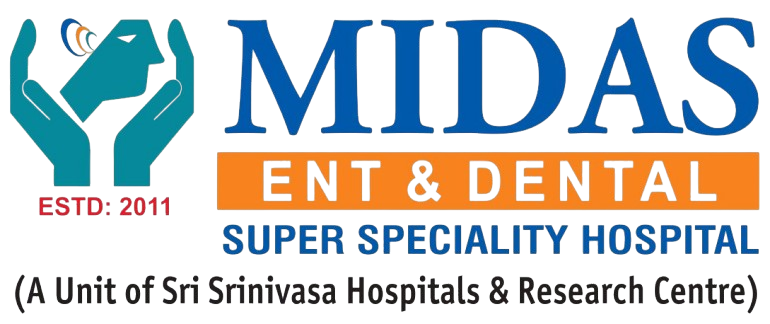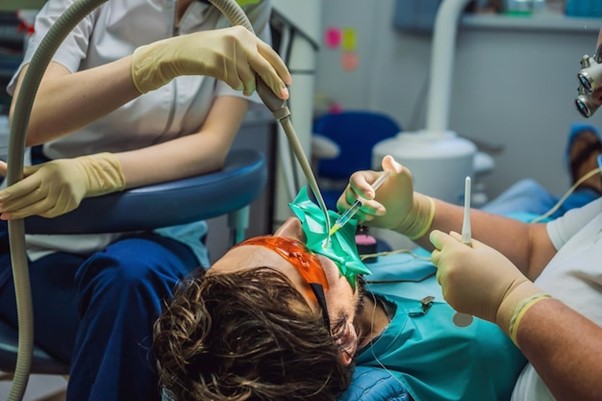When it comes to dental procedures, the idea of undergoing treatment can often cause fear and anxiety. Whether it’s a regular dental check-up or a more complex dental procedure, many people experience significant discomfort at the thought of dental work. This is where dental sedation comes into play, offering patients a way to feel at ease and relaxed during their treatment. Sedation in dentistry has revolutionized the way dental professionals approach procedures, ensuring that patients are not only comfortable but also that their overall experience is stress-free.
In this comprehensive guide, we will explore the different types of sedation available in dentistry, the benefits of sedation, and how Midas ENT & Dental Super Specialty Hospital can provide the safest and most effective sedation options for a variety of dental treatments.
What is Dental Sedation?
Dental sedation refers to the practice of using medication to help patients relax and feel more comfortable during dental procedures. While sedation does not necessarily put patients to sleep, it does significantly reduce anxiety and discomfort, allowing the dental team to work efficiently. The level of sedation varies depending on the type of medication used, ranging from light relaxation to complete unconsciousness.
Sedation dentistry has been a breakthrough for individuals who have dental phobia, a fear of dental treatment, or those who have a low pain threshold. It helps create relaxed state, making dental visits more manageable and less stressful.
Types of Sedation in Dentistry
There are several types of sedation employed in dentistry, each suited to different types of procedures and individual patient needs. The choice of sedation will depend on the complexity of the procedure, the patient’s health condition, and their level of anxiety. Below are the most common types of sedation used in dental practices:
- Minimal Sedation (Anxiolysis)
Minimal sedation is the lightest form of sedation, used for patients who experience mild anxiety. It helps the patient to feel relaxed, calm, and at ease during the procedure, but they remain fully conscious and alert. Patients can still respond to verbal instructions, and they typically retain their ability to communicate with the dentist.
- Common forms of minimal sedation: Nitrous oxide (laughing gas) or oral sedatives (such as diazepam) are commonly used for this level of sedation.
- Duration: The effects wear off quickly, and the patient can resume normal activities almost immediately after the procedure.
- Moderate Sedation (Conscious Sedation)
Moderate sedation, also known as conscious sedation, is used for more invasive dental procedures that may cause discomfort or anxiety. Under moderate sedation, patients remain conscious and can respond to commands, but they are in a deeply relaxed state. Many people describe this level of sedation as being in a state of “twilight sleep,” where they are aware of what is happening but do not feel pain or stress.
- Common forms of moderate sedation: Nitrous oxide, oral sedatives, or intravenous (IV) sedation.
- Duration: The effects last longer than minimal sedation, but the patient will be awake and responsive throughout the procedure.
- Deep Sedation
Deep sedation brings the patient to the point of semi-consciousness, where they are on the edge of sleep but can still be awakened with difficulty. This level of sedation is used for patients who are undergoing more complex dental procedures, such as extractions or surgeries, or those who have severe dental anxiety.
- Common forms of deep sedation: Intravenous (IV) sedation or oral sedatives in higher doses.
- Duration: The patient will remain in a deep relaxed state throughout the procedure, but they may not remember the experience after it is over.
- General Anesthesia
General anesthesia is the deepest level of sedation, where the patient is completely unconscious and unaware of their surroundings. This type of sedation is used for extensive oral surgeries or for patients who cannot tolerate other types of sedation due to medical reasons or severe dental fear. With general anesthesia, patients do not experience any discomfort or pain and have no recollection of the procedure.
- Common forms of general anesthesia: IV medications administered by an anesthesiologist, and in some cases, inhaled gases.
- Duration: The patient is under anesthesia for the entire duration of the procedure, and they may take some time to wake up after the procedure is completed.
Benefits of Sedation Dentistry
Sedation dentistry offers numerous benefits, especially for those who struggle with dental anxiety or have complex dental needs. Here are some of the key advantages:
- Reduces Anxiety and Fear: For many people, the thought of a dental procedure causes feelings of dread and fear. Sedation helps alleviate these emotions by promoting relaxation and a sense of calm. Patients who might otherwise avoid dental care due to anxiety are more likely to visit the dentist for regular check-ups and treatments when sedation is available.
- Pain Management: Sedation helps control pain during dental procedures. Even if local anesthesia is used, sedation can make the experience more comfortable by enhancing the numbing effect and ensuring that patients do not feel any discomfort during their treatment.
- Improved Cooperation: Sedation allows patients to remain still and calm, making it easier for the dentist to complete the procedure efficiently. This is especially helpful for children, individuals with special needs, or patients who have difficulty sitting still for extended periods.
- Time Efficiency: With sedation, dental procedures that may take a long time can be completed in a single visit. This reduces the need for multiple appointments, saving time and allowing patients to avoid the stress of coming back for follow-up treatments.
- Increased Comfort for Complex Procedures: For patients undergoing complex dental work, such as root canals, extractions, or oral surgeries, sedation provides the necessary relaxation and pain relief to make the procedure more comfortable. The dentist can focus on performing the procedure without worrying about the patient’s discomfort.
Who Can Benefit from Sedation Dentistry?
Sedation dentistry is beneficial for a wide variety of patients, including:
- Patients with Dental Anxiety: If the mere thought of visiting the dentist causes overwhelming anxiety, Sedation dentistry can ease these anxieties and make dental visits more comfortable.
- Patients with a Low Pain Tolerance: For individuals who experience heightened sensitivity to pain, sedation ensures a more comfortable experience during treatment.
- Patients Undergoing Complex Procedures: More invasive or lengthy dental treatments are made more comfortable with sedation.
- Patients with Special Needs: Individuals with physical, mental, or developmental disabilities may find dental sedation helpful in managing their dental appointments more easily.
- Children: Young children who are anxious or unable to sit still for procedures may benefit from sedation to help them remain calm and cooperative.
Safety Considerations in Dental Sedation
While sedation dentistry is generally safe, it is important to consult with a trained and experienced dental professional to determine the best sedation option for you. Safety is a priority when using any form of sedation, and your dentist will carefully evaluate your current health status, medical history, and the nature of the procedure before recommending a sedation option.
Some safety tips to keep in mind include:
- Honest Medical History: Be sure to inform your dentist of any pre-existing medical conditions, allergies, medications, or previous sedation experiences.
- Monitoring During Treatment: Dentists and anesthesiologists monitor patients closely during sedation to ensure their safety. Vital signs such as oxygen levels, heart rate and blood pressure are tracked.
- Post-Treatment Care: After sedation, patients should avoid driving or operating machinery for the rest of the day. It’s important to arrange for someone to take you home after your appointment if general anesthesia or deep sedation was used.
Sedation Dentistry at Midas ENT & Dental Super Specialty Hospital
At Midas ENT & Dental Super Specialty Hospital, we understand the importance of delivering a comfortable and safe dental experience. Our team of highly skilled dentists and anesthesiologists is committed to offering the best sedation options to guarantee that each patient receives the utmost care. level of care, whether it’s for a routine dental cleaning or a complex oral surgery.
We provide a range of sedation options tailored to the specific needs of our patients, ensuring a comfortable and stress-free experience. Our hospital is equipped with state-of-the-art facilities, and we prioritize patient safety, comfort, and overall well-being.
Why Choose Midas ENT & Dental Super Specialty Hospital?
- Expert Team: Our dental professionals and anesthesiologists are highly trained in sedation techniques, ensuring your safety and comfort.
- Personalized Care: We tailor sedation options based on your health condition, procedure requirements, and level of anxiety, providing the best solution for your unique needs.
- Advanced Technology: Our hospital uses the latest sedation technology and monitoring equipment to ensure a smooth and safe procedure from start to finish.
- Comprehensive Services: From routine dental check-ups to complex surgical procedures, we offer a full range of services under sedation to address all your dental needs.
Dental sedation is a valuable tool that has transformed the dental experience for many patients. It provides comfort, reduces anxiety, and ensures that dental treatments are carried out efficiently and painlessly. Whether you’re undergoing a minor procedure or a more complex treatment, sedation dentistry can help make your visit more comfortable and less stressful.
At Midas ENT & Dental Super Specialty Hospital, we are dedicated to providing a safe, effective, and comfortable sedation experience. If you are considering dental sedation, our expert team is here to guide you through the process and offer the best options for your needs.


